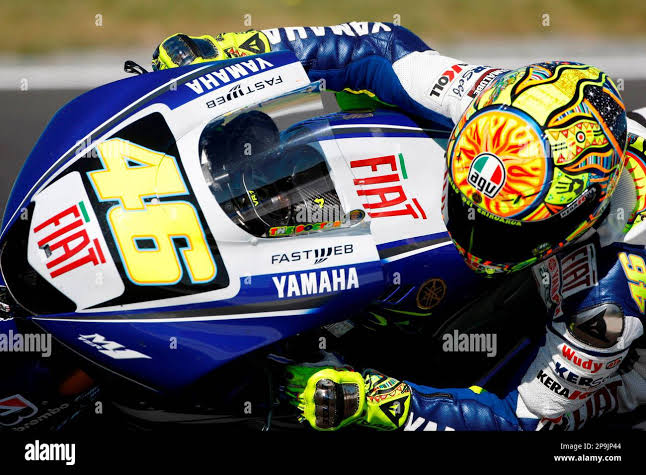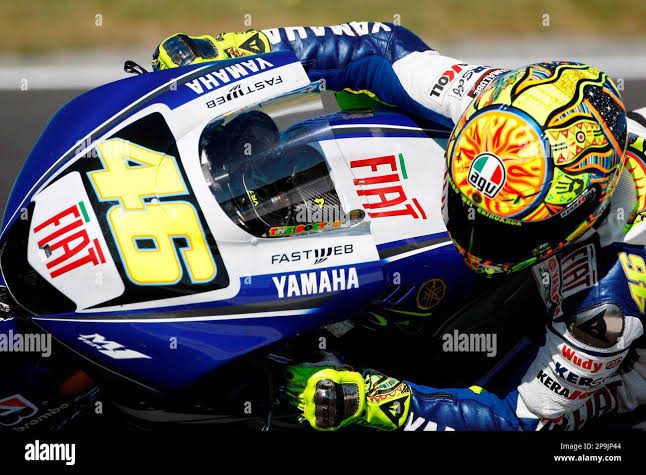
Valentino Rossi’s Arrival and Its Impact on Ducati’s MotoGP Development: Ducati progress in his field was…
Valentino Rossi, one of the most celebrated riders in MotoGP history, made his high-profile switch to Ducati in 2011 after a dominant career with Yamaha. His move was highly anticipated, as many believed that Rossi’s immense skill and experience would propel Ducati to the top of the MotoGP standings. However, despite Rossi’s legendary status, his time with Ducati became one of the most challenging periods in the team’s history. Rather than achieving the success many had hoped for, Rossi’s arrival led to a series of complications that hindered Ducati’s development, ultimately leaving the team struggling to reach its full potential.
The Technical Struggles of the Ducati Desmosedici
When Rossi joined Ducati, the team was already facing difficulties with its Desmosedici GP11 motorcycle, which had proven to be a difficult machine to tame. The bike, designed with a unique frame and engine configuration, was underperforming compared to the more refined Yamaha and Honda machines. Rossi, known for his ability to develop bikes and extract the maximum performance from them, was expected to turn Ducati’s fortunes around. However, instead of bringing immediate improvements, Rossi’s feedback highlighted the motorcycle’s flaws more prominently.

The Desmosedici was particularly difficult in terms of handling and stability, particularly in corners, where Rossi and other riders found it difficult to match the competition. The Italian bike had a unique “big-bang” engine, which produced a distinctive power delivery, but it was unpredictable, making it hard for riders to control. Despite Rossi’s experience, the bike was too far behind in terms of fundamental development to make an immediate impact.
Rossi’s struggles with the bike, combined with the fact that the Ducati team had not yet developed a proper understanding of how to improve the Desmosedici, led to a significant decline in the team’s performance. Rossi’s inability to adapt quickly to the bike, or for Ducati to adapt the bike to Rossi’s style, contributed to a series of disappointing results, with Rossi failing to achieve podium finishes for much of his time at Ducati.
Development Stagnation and the Leadership Shift
Rossi’s presence at Ducati did not just affect the technical development of the bike; it also caused shifts in team dynamics and priorities. Ducati, which had been heavily invested in Rossi’s arrival, began to focus its efforts primarily on satisfying the needs of their star rider. This focus often meant that other riders, like Nicky Hayden, were left behind in terms of technical feedback and development opportunities.
Moreover, Ducati’s management, which had been eager to impress Rossi, sometimes shifted their development priorities to align with the rider’s preferences, rather than focusing on the bike’s long-term evolution. This lack of a cohesive development strategy led to stagnation, as changes were often reactive rather than proactive.
Changing the Team’s Approach
By the end of Rossi’s time at Ducati in 2012, it was clear that the combination of a difficult bike and an inability to adapt the motorcycle to Rossi’s riding style had set the team back. However, his time with Ducati was not entirely fruitless. The feedback he provided did help Ducati make improvements to the Desmosedici, and after Rossi’s departure, the team was able to regroup and focus on refining its development strategy.
In 2013, Ducati made significant progress with the Desmosedici, with new team leadership under Gigi Dall’Igna. This marked a shift towards a more coherent technical approach, focusing on improving key areas such as chassis stability, electronics, and engine power delivery. In the years following Rossi’s departure, Ducati saw incremental improvements, culminating in a competitive bike that eventually allowed them to win multiple races and secure podium finishes.
- Conclusion
While Valentino Rossi’s time at Ducati was marked by technical struggles and disappointments, it ultimately played a crucial role in shaping the future of the team. His feedback and experiences highlighted the significant shortcomings of the Desmosedici, which in turn led to a reassessment of the team’s development strategy. Despite not winning any titles during his tenure, Rossi’s involvement in Ducati’s MotoGP project paved the way for future successes, making his stay a critical learning period in the team’s history.
Leave a Reply